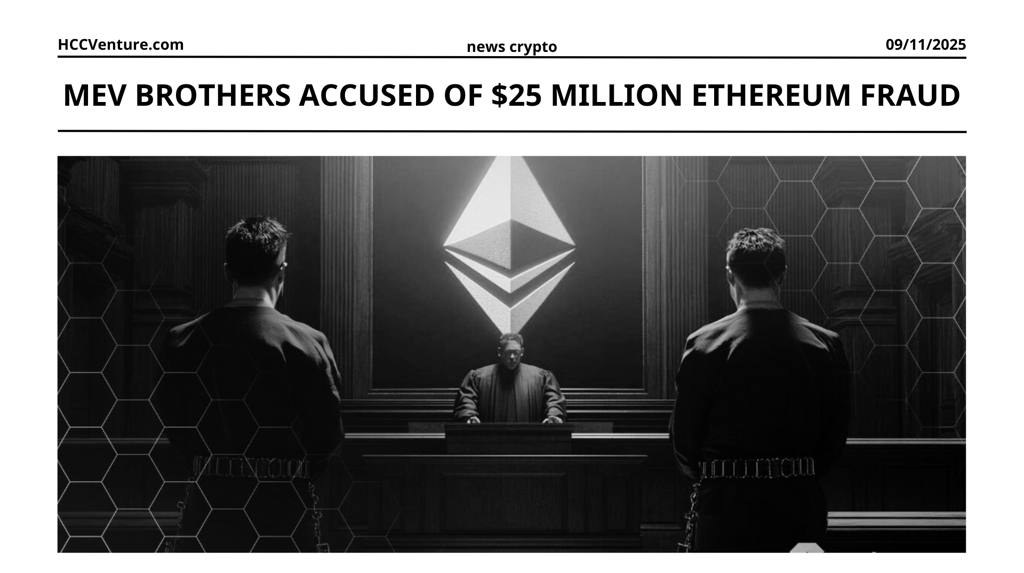MEV Brothers Accused of $25 Million Ethereum Fraud
A federal jury in New York has dismissed a trial after failing to reach a unanimous verdict in the high-profile case of MEV Brothers defrauding the MEV bot of more than $25 million.
11/9/20252 min read


Deadlock after four weeks of testimony
The brothers, aged 29 and 25, face charges of wire fraud, money laundering, and conspiracy to commit a 12-second exploit in April 2023, draining $25 million from Ethereum's mempool by front-running a $110 million transaction using custom MEV bots.
The Peraire-Buenos brothers are accused of manipulating transaction orders to cash out fees, laundering money through mixers like the Tornado Cash fork—earning $13 million in profits. Defense attorneys countered that the brothers' actions were "legitimate MEV optimization," exploiting the public mempool mechanism inherent in Ethereum's design, and not fraud—echoing arguments in the Tornado Cash cases that code is "speech."
The jury, polled after 10 hours of deadlock, said it was split 9-3 in favor of acquittal, citing confusion about the “intent” in algorithmic trading – many “wept and lost sleep” over technical testimony, according to trial transcripts.
Legal implications in the industry
The dismissed case highlights a key tension between decentralized systems and the existing regulatory framework. MEV, once an obscure blockchain concept, has evolved into a multi-billion dollar underground market where traders compete to extract value from blockchain organization and transaction visibility.
Legal experts say the case could set a precedent for how blockchain-based market manipulation is defined, with implications extending to validators, relayers, and algorithmic trading bots operating on Ethereum, Solana, and other proof-of-stake chains.
Broader market reaction
The ruling comes at a sensitive time for Ethereum’s authentication ecosystem, which has recently come under increased scrutiny from both the SEC and CFTC due to concerns that authentication infrastructure could be used to prioritize trading.
Meanwhile, MEV-related protocols such as Flashbots, MEV-Boost, and Skip Protocol have sought to introduce ethical frameworks for block building, promoting transparency and redistribution mechanisms (such as sharing MEV with stakers and users).
However, the trial’s outcome shows that even with these improvements, the ethical and legal boundaries of MEV remain deeply contested. Following the dismissal of the trial, some DeFi developers expressed concern that new enforcement actions could follow, especially if regulators classify some MEV behavior as unauthorized forms of front-running.
Disclaimer: The information presented in this article is the author's personal opinion in the cryptocurrency field. It is not intended to be financial or investment advice. Any investment decision should be based on careful consideration of your personal portfolio and risk tolerance. The views expressed in this article do not represent the official position of the platform. We recommend that readers conduct their own research and consult with a professional before making any investment decisions.
Explore HCCVenture group
HCCVenture © 2023. All rights reserved.

Connect with us
Popular content
Contact to us
E-mail : sp_contact@hccventure.com
Register : https://linktr.ee/holdcoincventure
Disclaimer: The information on this website is for informational purposes only and should not be considered investment advice. We are not responsible for any risks or losses arising from investment decisions based on the content here.


TERMS AND CONDITIONS • CUSTOMER PROTECTION POLICY
ANALYTICAL AND NEWS CONTENT IS COMPILED AND PROVIDED BY EXPERTS IN THE FIELD OF DIGITAL FINANCE AND BLOCKCHAIN BELONGING TO HCCVENTURE ORGANIZATION, INCLUDING OWNERSHIP OF THE CONTENT.
RESPONSIBLE FOR MANAGING ALL CONTENT AND ANALYSIS: HCCVENTURE FOUNDER - TRUONG MINH HUY
Read warnings about scams and phishing emails — REPORT A PROBLEM WITH OUR SITE.
